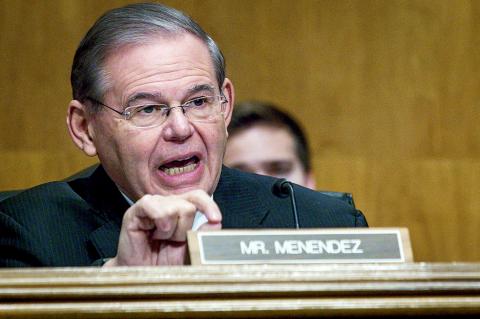A bill to encourage exchange visits by Taiwanese and US government officials was on Wednesday passed by the US Senate Committee on Foreign Relations.
US Senator Bob Corker, the chairman of the committee, said the passage of the Taiwan Travel Act shows that Taipei and Washington embrace common interests.
The committee passed the legislation without any amendment.

Photo: AFP
The bill is now to move on to the floor of the US Senate.
Ahead of the committee vote, Corker told the committee members that Taiwan is a good friend and partner of the US, and that Taipei has been providing assistance to Washington in dealing with a wide range of matters on the international stage.
Senior US government officials rarely visit Taiwan because of Washington’s formal diplomatic ties with China and lack of official relations with Taipei.
When then-US Environmental Protection Agency administrator Gina McCarthy traveled to Taiwan in 2014, she was the first Cabinet-level US official to visit the nation in 14 years.
No other official of that level has visited since.
“The United States government should encourage visits between officials from the United States and Taiwan at all levels,” the bill states.
The legislation aims to “allow officials at all levels of the United States government, including Cabinet-level national security officials, general officers and other executive branch officials, to travel to Taiwan to meet their Taiwanese counterparts,” the bill says.
US Senator Robert Menendez, one of the sponsors of the bill, said a move by the US to continue its commitment to Taiwan is critical to the security of Washington, as the two sides have established close ties through their similar attitudes on democracy and human rights.
The bill passed by the committee is the same version approved by the US House of Representatives last month, so if the US Senate passes the legislation there would be no need for the two chambers to negotiate over a final version and the bill could be sent directly to US President Donald Trump to sign into law.
Beijing is closely watching to see whether US Congress acts on the Taiwan Travel Act, US political news Web site Politico reported earlier this month.
In Taipei, the Ministry of Foreign Affairs yesterday welcomed the committee’s passage of the act, saying that it fully supported the intent of the bill and welcomed visits by senior US officials.
The bill’s passage reflects bipartisan support in the US Congress to deepen bilateral relations with Taiwan, ministry spokesman Andrew Lee (李憲章) said, adding that the ministry would keep close tabs on developments related to the legislation.
Visits by senior US officials to Taiwan on economic investment, culture and education, as well as energy collaboration, have demonstrated that the US Department of State and the US Congress have been making sincere efforts to promote practical US-Taiwan interactions, he said.
It might take the US Senate several weeks before it votes on the bill, he added.

PREPAREDNESS: Given the difficulty of importing ammunition during wartime, the Ministry of National Defense said it would prioritize ‘coproduction’ partnerships A newly formed unit of the Marine Corps tasked with land-based security operations has recently replaced its aging, domestically produced rifles with more advanced, US-made M4A1 rifles, a source said yesterday. The unnamed source familiar with the matter said the First Security Battalion of the Marine Corps’ Air Defense and Base Guard Group has replaced its older T65K2 rifles, which have been in service since the late 1980s, with the newly received M4A1s. The source did not say exactly when the upgrade took place or how many M4A1s were issued to the battalion. The confirmation came after Chinese-language media reported

A Ministry of Foreign Affairs official yesterday said that a delegation that visited China for an APEC meeting did not receive any kind of treatment that downgraded Taiwan’s sovereignty. Department of International Organizations Director-General Jonathan Sun (孫儉元) said that he and a group of ministry officials visited Shenzhen, China, to attend the APEC Informal Senior Officials’ Meeting last month. The trip went “smoothly and safely” for all Taiwanese delegates, as the Chinese side arranged the trip in accordance with long-standing practices, Sun said at the ministry’s weekly briefing. The Taiwanese group did not encounter any political suppression, he said. Sun made the remarks when

The Taiwanese passport ranked 33rd in a global listing of passports by convenience this month, rising three places from last month’s ranking, but matching its position in January last year. The Henley Passport Index, an international ranking of passports by the number of designations its holder can travel to without a visa, showed that the Taiwan passport enables holders to travel to 139 countries and territories without a visa. Singapore’s passport was ranked the most powerful with visa-free access to 192 destinations out of 227, according to the index published on Tuesday by UK-based migration investment consultancy firm Henley and Partners. Japan’s and

BROAD AGREEMENT: The two are nearing a trade deal to reduce Taiwan’s tariff to 15% and a commitment for TSMC to build five more fabs, a ‘New York Times’ report said Taiwan and the US have reached a broad consensus on a trade deal, the Executive Yuan’s Office of Trade Negotiations said yesterday, after a report said that Washington is set to reduce Taiwan’s tariff rate to 15 percent. The New York Times on Monday reported that the two nations are nearing a trade deal to reduce Taiwan’s tariff rate to 15 percent and commit Taiwan Semiconductor Manufacturing Co (TSMC, 台積電) to building at least five more facilities in the US. “The agreement, which has been under negotiation for months, is being legally scrubbed and could be announced this month,” the paper said,